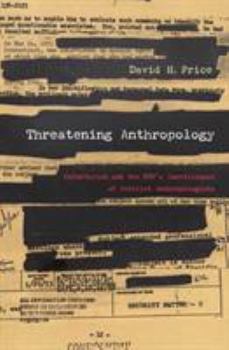Threatening Anthropology: McCarthyism and the Fbi's Surveillance of Activist Anthropologists
Select Format
Select Condition 
Book Overview
Price draws on extensive archival research including correspondence, oral histories, published sources, court hearings, and more than 30,000 pages of fbi and government memorandums released to him under the Freedom of Information Act. He describes government monitoring of activism and leftist thought on college campuses, the surveillance of specific anthropologists, and the disturbing failure of the academic community--including the American Anthropological Association--to challenge the witch hunts. Today the "war on terror" is invoked to license the government's renewed monitoring of academic work, and it is increasingly difficult for researchers to access government documents, as Price reveals in the appendix describing his wrangling with Freedom of Information Act requests. A disquieting chronicle of censorship and its consequences in the past, Threatening Anthropology is an impassioned cautionary tale for the present.





